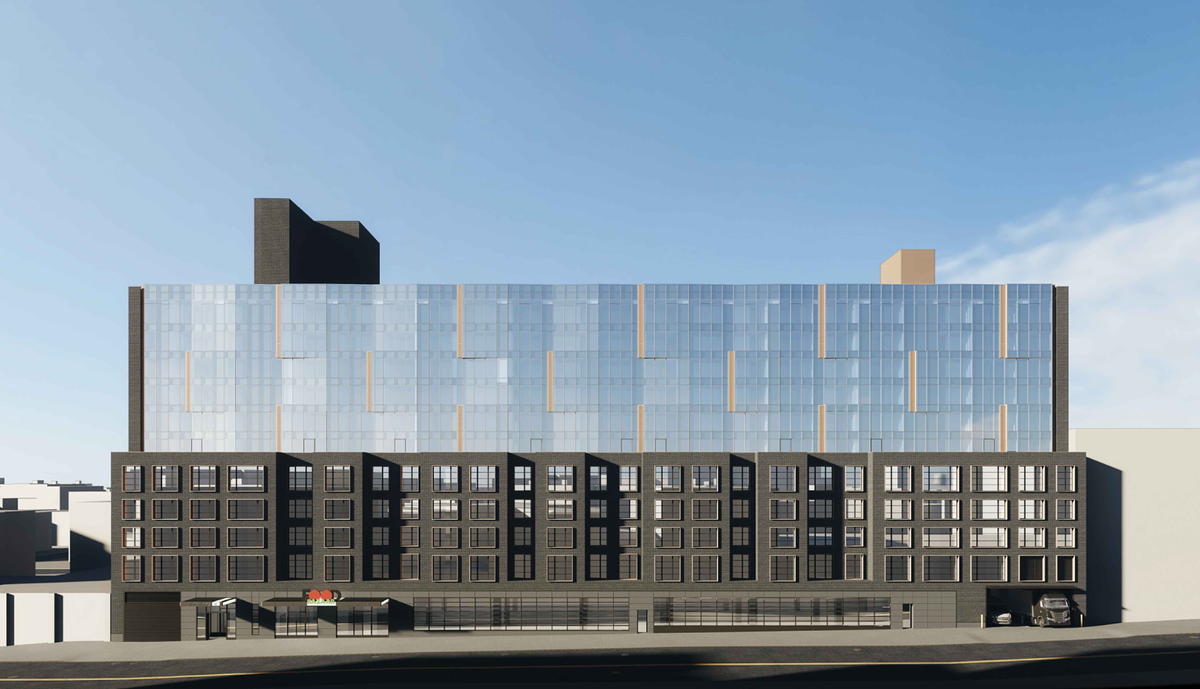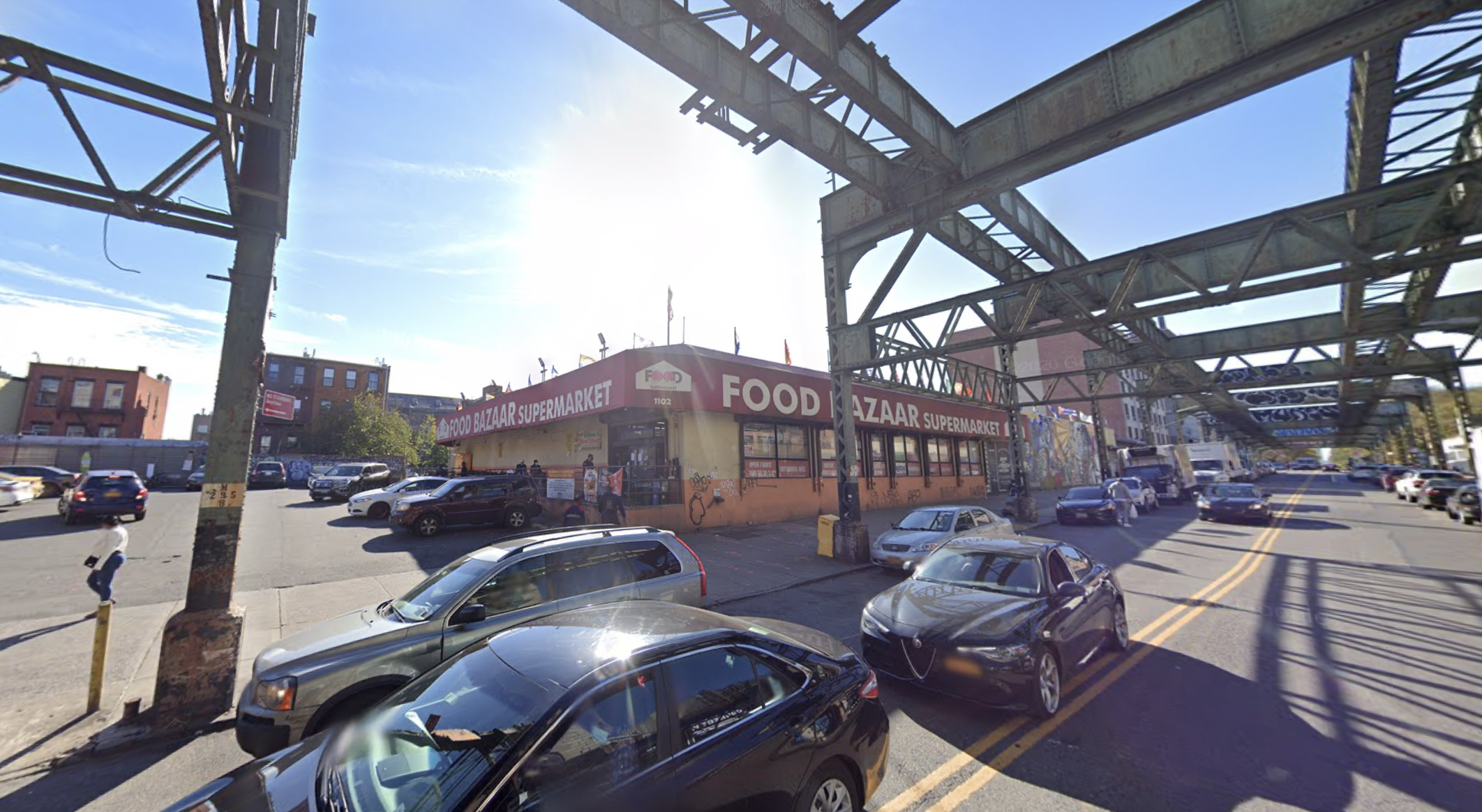11-Story Mixed-Use Development Coming to Bed-Stuy Grocery Site


A grocery on the border of the Bedford-Stuyvesant and Bushwick neighborhoods will be closed for two years before reopening in the ground floor of a new, 11-story mixed-use building. The site will also be subject to environmental remediation.
The Food Bazaar at 1100 Myrtle Avenue near Broadway closed earlier this week, the first step in a redevelopment process that will eventually bring a 195,821-square-foot building with a revamped supermarket and about 233 apartments to the site.
BOGOPA Enterprises, the owner-operator of Food Bazaar, told Bklyner the project would be completed sometime in 2023.
The project does not require a rezoning. But BOGOPA, along with developer Shorewood Real Estate Group, is taking advantage of two city programs that allow it to build slightly taller than the site’s C4-4L/R6B zoning would otherwise allow.
A portion of the lot is mapped as an Inclusionary Housing designated area, allowing BOGOPA 9,235 square feet in bonus floor area in exchange for making 38 of the building’s units below-market rate, though documents submitted to the city did not specify specific rents.
The developer was also granted a bonus under the city’s FRESH program for committing to put a new, 25,261-square-foot Food Bazaar on the ground floor.
BOGOPA filed for permits in January to demolish the existing one-story building, which was constructed in 1980 and originally served as a dollar skating rink, documents show.

“We are fully committed to our urban grocery strategy and the Borough of Brooklyn,” a BOGOPA spokesperson told Bklyner in a statement. “This very substantial investment of over $150 million at 1100 Myrtle Avenue demonstrates our long-term confidence in New York City, especially as we, as a community, move forward from the COVID health crisis.”
But before construction can happen, the site’s soil needs a deep clean.
As part of the re-development, the project was accepted into New York State’s Brownfield Cleanup Program in July 2020. According to the state’s Department of Environmental Conservation, portions of the site were previously used for industrial activities that included an auto garage with a gasoline tank, auto repair, and furniture manufacturing.
An analysis of the site found elevated levels of several potentially problematic compounds and metals in the soil, soil vapor and groundwater, including pesticides and chemicals related to petroleum use.
Nevertheless, the analysis says, “the majority of the Site is capped with the building foundation, asphalt, or gravel; and the slab and pavement were observed to be in good condition with minimal fractures, breaks and open areas. Therefore, ingestion, inhalation, or dermal contact with contaminants via soil/fill, groundwater, and/or soil vapor is not a concern.”
A remedial action plan created for the site by the consulting firm AKRF includes plans to excavate contaminated soil and fill at depths of up to 20 feet to remove remnants of petroleum, pesticides and metals. The plan says air monitoring will be performed at the site’s perimeter during soil remediation.
On Twitter, BOGOPA directed customers to visit other Brooklyn Food Bazaar sites, the closest of which is just under a mile away, at 21 Manhattan Avenue. A Bravo Supermarket is slightly over a half-mile away, on Dekalb Avenue.
REMINDER: Our Myrtle Ave. location will be temporarily closed for renovations. pic.twitter.com/9oHN0SLY4D
— Food Bazaar Supermarket (@MyFoodBazaar) April 19, 2021
But the news prompted mixed reactions from local residents. While some expressed excitement that the supermarket would get a refresh, others voiced concern about losing a neighborhood grocery for two years.
Adorn Dubose, president of the tenant association at the nearby NYCHA Sumner Houses, said she also worried about older residents who would have to travel further for groceries until the project is complete.
“We have seniors that go shopping by themselves, they have to travel further now,” Dubose said. “Manhattan Avenue is much further for them. Before all they had to do was walk maybe a block or two, which wasn’t so bad, as opposed to having to walk four or five blocks. So it is a concern for the elderly and the seniors.”
Supermarket redevelopments have raised concerns in other parts of the borough; in Crown Heights, an escalating battle over the future of an Associated Supermarket and the grocery’s landlord has prompted protests from residents and a lawsuit.





